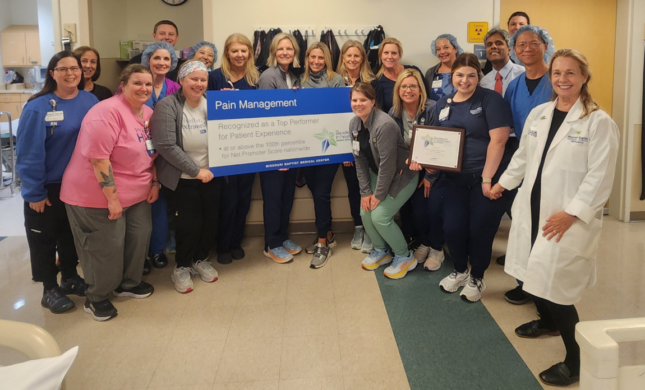BJC HealthCare recently announced the winners of the 2024 Professional Research Consultants (PRC) Excellence in Healthcare Awards. Only 14 units across the system were designated as Top Performers. Among the standout units is the Pain Management Center at Missouri Baptist Medical Center.

According to assistant nurse manager Michelle Skornicka, building and maintaining relationships with patients and within the care team is the secret to this team’s success.
“We are a small team and see patients over long periods, even up to years, so we get to know each other. They know the members of our team by name and will ask about someone who isn’t there that day,” she says, “We know them, too. We know about their families, their travel plans, their big events.” Skornicka said what makes these relationships especially effective for care is that they are “working relationships. Our team and the providers work closely with patients to create a care plan. They are part of the process.”
Relationships within the team also lead to better patient experiences and outcomes. Skornicka explains, “If a patient is in pain and a nurse doesn’t know what to do, they feel very comfortable asking the provider for ideas. Our providers are approachable and open to ideas. They are very education-focused and always share what they learn with the team.”
There are also opportunities for education in every direction. Non-nursing staff will educate the rest of the care team about insurance, for example, which directly impacts the care plan and the patient experience.
Patient care manager Inna Lowe explains some of this education takes place in the moment, but the team also has “protected time” on the schedule. Bi-monthly late-start Thursdays allow for staff meetings, when team members know they will have an opportunity to ask questions and discuss issues.
Lowe says, “having that stability and protected time is important for team-building and a well-functioning team.”
This time also allows the interdisciplinary team to come together to align and improve current practices.
“The interdisciplinary team within the Pain Clinic includes physicians, nurses, radiology techs, front desk staff, pre-authorization representatives, as well as a nurse coordinator,” explains Lowe. The ability to work well together both drives positive team comradery and reflects directly on the team’s excellent patient care.
Emilie Rinck, who will step in as interim assistant nurse manager for Skornicka, says this cohesiveness and willingness to collaborate can be felt by the patients.
“It can make a better experience for them. They see that we support each other, and that united front makes them feel more supported. They see we are like a family, that we have fun. They know we are on the same team and focused on the same goal.”
Patients see this in the interactions they observe, but they can also catch glimpses of the team culture throughout the clinic. The whiteboard usually features a game of “Hangman” that can go on for days.
“We celebrate so many wins, too” Skornicka says, “birthdays, anniversaries, babies, weddings, life events. We have lots of potlucks — for home openers, Blues openers, City openers — we decorate and have fabulous cooks and bakers!” Some team favorites include holiday cookie bake-offs and themed Halloween costumes (last year the team dressed as dalmatian puppies, and a provider dressed as Cruella de Vil).
Creating a warm and inviting space also helps address a significant issue for patients with chronic pain: stigma. Skornicka explained, “This is a safe space where you will be believed at face value by providers who want to help you. You don’t need to prove you’re in pain.” This empathy carries over into every interaction.
“You’re in pain, so we try to make this one of the better parts of your day,” says Skornicka. “We will call you back. We will expedite your case if necessary.”
Lowe says the clinic is a unique space because “it combines a clinic, a provider office and procedural space all within one unit in the hospital. The skill set of the people on our team is amazing. Nurses rotate through all duties, so there is built-in flexibility.”
A team as busy as the caregivers in Pain Management needs all the flexibility it can get. Lowe highlights the recent growth of the clinic space.
“The space was built out so we could increase our volume of visits and procedures. Now that we have the space, there is an immediate opportunity for more providers, and we are excited about the expansion.”
As the clinic’s capacity grows, patients can count on this team to continue providing extraordinary care. The mindset of the team, says Skornicka, is “outside of our walls, things are not always easy for our patients, so we try to offer an easing to the difficulty of their usual days. This is a place of respite.”
This story was originally published in the MoBap Mix, a weekly newsletter from the Missouri Baptist Medical Center.